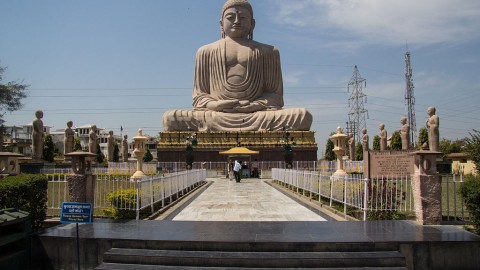Patanjali says,
IT CAN BE ACQUIRED THROUGH DRUGS, REPEATING SACRED WORDS, MANTRAS, AUSTERITIES, OR SAMADHI.
He’s in favor only of samadhi, but he’s a very, very scientific man. He has not left anything out.
Yes, it can be acquired through drugs, but that is the lowest glimpse of it. Through chemicals, you can have a certain glimpse, but that is almost a violence, almost a rape of God – because you are not growing into the glimpse; rather, you are forcing the glimpse upon yourself. You can take LSD, or marijuana, or something else: you are forcing your chemistry. If the chemistry is forced too much, for a few moments it becomes loosened from the conditioning of the mind. From the tunnel-like style of your life it becomes loose. You have a certain glimpse, but the glimpse is at a very great cost.
Now you will become addicted to the drug. Whenever you need the glimpse you will have to go to the drug, and each time you go the drug, more and more quantities of it will be needed. And you will not be growing at all, you will not be maturing at all. Only the drug will grow in quantity, and you will remain the same: This is getting a glimpse of the divine at a very great cost. It is not worth it. It is destroying yourself. It is suicidal, but Patanjali puts it there as a possibility. Many have tried that, and many have gone almost insane through it. It is dangerous to try any violence on the existence. One should grow naturally. At the most, it can be like a dream, but it cannot be a reality. A person who has been taking LSD for long remains the same person. He may talk about new spaces that he has achieved and he will talk about ‘far-out experiences’, but you can see that the man has remained the same. He has not changed. He has not attained any grace. It may be otherwise: he may have lost any grace that he already had before. He has not become more happy and blissful. Yes, under the impact of the drug he may laugh, but that laughter is also ill: it is not arising naturally, it is not flowering naturally. And after the impact of the drug he will be dull, he will have a hang-over; and he will again and again seek, again and again he will seek and search for the same glimpse. Now he will become hypnotized by the experience of the drug. It is the lowest possibility.
The second, better than this, is of the mantra. If you repeat a certain mantra for a long time, that too creates subtle chemical changes in your being. It is better than drugs, but still, that too is a subtle drug. If you repeat, Aum, Aum, Aum, continuously, the very repetition creates sound waves in you.
It is as if you go on throwing rocks into the lake and waves arise and arise and go on spreading, creating many patterns. The same happens when you use a mantra, the continuous repetition of any word. It has nothing to do with Aum, Ram, Ave Maria or Allah; it has nothing to do with them.
You can say, “Blah, blah, blah”; that will do. But you have to repeat the same, the same sound with the same tone, in a rhythm. It goes on falling on the same center again and again, and creating ripples, vibrations, pulsations. They move inside your being and spread out. They create circles of energy. It is better than drugs, but it is still of the same quality.
That’s why Krishnamurti goes on saying that mantra is a drug. It is a drug, and he is not saying anything new; Patanjali says the same. It is better than the drug: you don’t need any injection, you are not dependent on any outside agency. You are not dependent on the drug-pusher because he may not be giving you the right thing. He may be handing you something bogus. You need not depend on anybody. It is more independent than drugs. You can repeat your mantra inside you, and it is more in tune with society. The society will not object that you repeat: Aum, Aum, Aum, but if you take LSD the society will object. Chanting is better, more respectable, but still a drug. It is through sound that the chemistry of your body is changed.
Now, much experimentation is going on with sound, music, and chanting. It certainly changes chemistry.
A plant grows faster if it is surrounded by music – by a certain music of course – classical or Indian; not by modern Western music. Otherwise, the growth stops, or the plant goes crazy. With subtle vibrations, with great rhythm and harmony, the plant grows faster. The growth is almost doubled and the flowers come bigger, more colorful; they live longer and they have more fragrance. Now these are scientific truths. If a plant is affected so much by sounds, much more will happen to human beings. And if you can create an inner sound, a continuous vibration, it will change your physiology, your chemistry – your mind, your body – but it is still an outside help. It is still an effort: you are doing something. And by doing you are creating a state which has to be maintained. It is not naturally spontaneous. If you don’t maintain it for a few days, it will disappear. So, that too is not a growth.
Once a Sufi visited Osho. For thirty years he had been doing a Sufi mantra, and had done it really sincerely. He was full of vibrations – very alive, very happy, almost ecstatic the whole day, as if in samadhi… drunk. His disciples brought him to Osho. He stayed with him for three days. Osho told him, “Do one thing: for thirty years you have been doing a certain chanting; stop for three days.” He said, “Why?” Osho said, “Just to know whether it has happened to you yet or not. If you go on chanting you will never know. You may be creating this drunkenness by chanting continuously. You drop it for three days and just see.” He became a little afraid, but he understood the point.
Because unless something becomes so natural that you need not do it, you have not attained it.
Just within three days, everything disappeared; just within three days! A thirty-year effort, and after the third day the man started crying and he said, “What have you done? You have destroyed my whole SADHANA!” Osho said, “I have not destroyed anything; you can start again. But now remember, if you repeat for thirty lives even, you will not attain. This is not the way. After thirty years, you cannot go for a three-day holiday? That seems to be a bondage, and it has not yet become spontaneous. It has not yet become part of you; you have not grown. These three days have revealed to you that for thirty years the whole effort has been in the wrong direction. Now it is up to you. If you want to continue, continue. But remember, now don’t forget that any day it can disappear; it is a dream that you are holding through continuous chanting. It is a certain vibration that you are holding, but it is not arising there. It is cultivated, nurtured; it is not yet your nature.”
The third way is by austerities, by changing your way of life, not hankering for comfort, convenience: for food, for sleep, for sex; dropping all that the mind naturally desires and doing just the opposite.
That is still a little higher than mantras. If the mind says go to sleep, the man of austerities says, “No, I’m not going to sleep. I am not going to be a slave to you. When I would like to go to sleep, I will go; otherwise not.” The mind says, “You are feeling hungry, now go and beg”; the man of austerities says, “No!” The man of austerities says no continuously to his mind. That is what austerity is: saying no to the mind. Of course, if you continuously say no to the mind, the conditioning becomes loosened.
Then the mind is no longer powerful over you, then you are released a little. But that no has to be said again continuously. Even if you listen to the mind for one day, again the whole power of mind will return to dominate and possess you. So just a moment’s going astray, and all is lost.
The man of austerities is doing better; he is doing something more permanent than the man of chanting – because when you chant, your life-style remains unchanged. Just inside, you feel good: a certain well-being. That’s why Maharishi Mahesh Yogi’s Transcendental Meditation has so much appeal in the West, because he does not ask you to change your life-style. He says, “Whatsoever, wherever you are, it’s okay.” He does not want you to make a disciplined life; simply repeat the mantra, twenty minutes in the morning and twenty minutes in the evening, and that will do. Of course, it will give you better sleep, a better appetite. You will be more calm and quiet. In situations where anger was easy, it will not be so easy. But you have to continue the chanting every day. It will give you a certain inner bath in sound waves. It will give you a little cleansing, but it is not going to help you grow. Austerities help more because your life starts changing.
If you decide not to do a certain thing, the mind will insist that you do it. If you go on denying the mind, your whole life pattern changes. But, that too is forced. People who are in austerities too much lose grace, become a little ugly. Constant struggle and fight, and constant repression and saying no creates a very deep rift in their beings. They may have more permanent glimpses than the man of chanting or the man who is addicted to drugs. They will have more permanent results than Timothy Leary and Mahesh Yogi, but still, it is not a spontaneous flowering. It is still not Zen, not real Yoga, not Tantra.
… OR SAMADHI.
Then comes the fourth which Patanjali has been trying to explain to you. Through samyama, through samadhi, everything has to be attained. Whatsoever he has been teaching up to now is through samyama, samadhi – bringing your awareness to it. The man of drugs works through the chemistry; the man of austerities works through the physiology; the man of chanting works through the sound structure of his being, but they are all partial. His totality is not yet touched by them. And they all will create a sort of lopsidedness. One part will grow too big, and other parts will lag behind, and he will become ugly.
Samadhi is the growth of the total.
And the growth has to be natural, spontaneous, not forced. The growth has to be through awareness; not through chemistry, not through physics, not through sound. The growth has to be through awareness, witnessing: that’s what samadhi is. Samadhi will bring you to the same point when you were born. Suddenly, it will reveal your being to you, who you are.
Tags: Patanjali Yoga Sutra 46 Growth Of The Total









